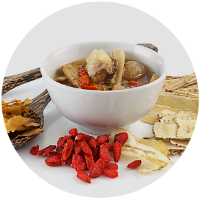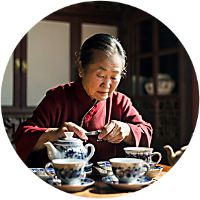Avoiding Excess:
Moderation Is a Key Principle in Chinese Dietetics
In traditional Chinese thinking, health is not something to chase after illness appears—it’s something to maintain quietly, day by day, through how we live. Nowhere is this more evident than in the dietary advice passed down through generations: eat simply, eat seasonally, and most importantly, don’t overeat.
 The ideal of moderation in Chinese dietetics is deeply rooted in both Confucian and Daoist thought. Confucian teachings promote self-restraint and social harmony, extending even to meals. A person who eats with care shows consideration not only for their own well-being, but for the order and balance of life. Daoism, meanwhile, reminds us that nature thrives on rhythm and proportion. Eating too much disturbs this rhythm—leading to stagnation, dampness, and a host of imbalances.
The ideal of moderation in Chinese dietetics is deeply rooted in both Confucian and Daoist thought. Confucian teachings promote self-restraint and social harmony, extending even to meals. A person who eats with care shows consideration not only for their own well-being, but for the order and balance of life. Daoism, meanwhile, reminds us that nature thrives on rhythm and proportion. Eating too much disturbs this rhythm—leading to stagnation, dampness, and a host of imbalances.
There’s a saying still commonly heard in Chinese families: qī fēn bǎo (七分饱)—"seven parts full." In other words, stop eating when you're about 70% satisfied. This practice not only supports digestion but cultivates awareness. It takes time for the body to register fullness. By stopping early, we allow the system to catch up, and avoid the sluggishness that often follows overeating.
From a traditional Chinese medicine (TCM) perspective, overeating burdens the Spleen and Stomach Qi. These are the key organs responsible for transforming food into energy and transporting it throughout the body. Too much food, especially rich, greasy, or raw dishes, overwhelms these functions. Over time, this can lead to fatigue, bloating, poor concentration, and even weight gain—not because calories are “bad,” but because the body’s systems are thrown off balance.
Portion control doesn’t require a scale or an app. It begins with noticing your hunger before you eat and observing your satisfaction level during the meal. Meals are best eaten slowly, without distraction, giving the body and mind time to engage. Drinking warm water or a mild tea with meals can also support digestion and slow down the pace of eating.
Many traditional Chinese meals are served in shared dishes rather than individual plates. This encourages pacing and interaction rather than mindless consumption. Soups and cooked vegetables form the foundation of most meals, with heavier foods like meat or fried items used in smaller amounts for flavor or seasonal support.
The point is not deprivation, but balance. Eating just enough allows the body to digest efficiently and leaves the mind clear. It’s a form of discipline, yes, but also a form of kindness—toward one’s body, one’s future health, and the larger rhythms of life.
In a culture that often celebrates indulgence, this quiet philosophy of restraint offers an alternative: that satisfaction doesn’t come from eating more, but from being more attuned to what we truly need.
Vocabulary Guide:
- Qī fēn bǎo (七分饱): “seven parts full,” the practice of stopping eating before reaching full satiety
- Qi (气): life force or energy, especially related to circulation and digestion in TCM
- Spleen qi (脾气 píqì): functional digestive energy; responsible for transforming and transporting food in the body







